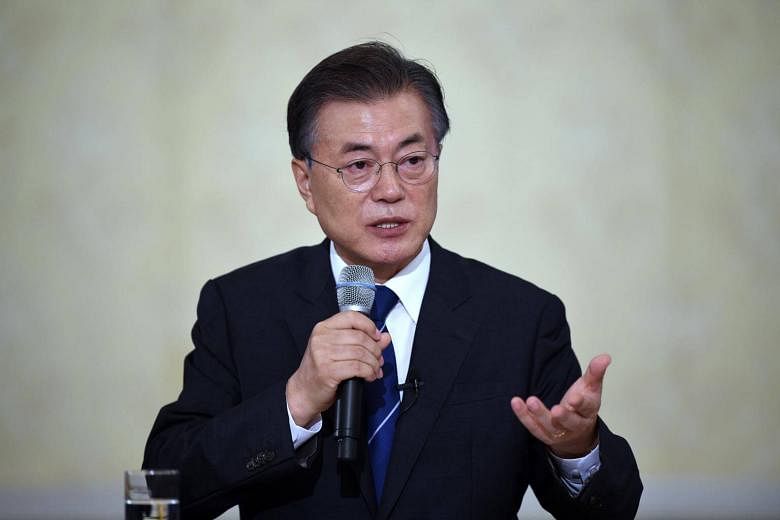TOKYO (THE YOMIURI SHIMBUN/ASIA NEWS NETWORK) - Does South Korean President Moon Jae In intend to make light of an important agreement that forms the basis of the normalisation of diplomatic ties between Japan and South Korea?
At a press conference marking his first 100 days in office, Mr Moon declared his view that former requisitioned workers mobilised from the Korean peninsula while it was a Japanese colony have a valid individual right to claim compensation from Japanese companies.
This comment, which one-sidedly overturned the view upheld by previous South Korean administrations, is unacceptable. The President's approach of stirring up historical issues will deepen the rift between Japan and South Korea. The Japanese government was quite right to protest Mr Moon's comment, saying it "casts a shadow on efforts to build a future-oriented relationship".
The 1965 Japan-South Korea agreement on property and claims and on economic cooperation, which was concluded at the same time as diplomatic ties were normalised, stipulated that the issues of claims between both sides, which included former requisitioned workers, have been "settled completely and finally".
In 2005, the administration of former South Korean president Roh Moo Hyun sorted out who this agreement applied to.
The Roh administration concluded former requisitioned workers were covered by the agreement, and that the South Korean government would handle any compensation and relief for the workers.
However, Mr Moon has readily relied on a 2012 South Korean Supreme Court ruling that found the individual right of former requisitioned workers to claim compensation still existed. An individual forced into labour "still has a civil affairs right against the Japanese company" they worked for, Mr Moon insisted.
The problem is that the top court's decision was based on anti-Japanese nationalism, rather than legal principles.
In Japan, court rulings that rejected compensation demands by former South Korean requisitioned workers have been finalised, for reasons including the expiry of the statute of limitations. The South Korean Supreme Court has taken the view that Japan's colonial rule of Korea was "illegal" and remanded lower-court rulings that followed Japanese court precedents.
The court also ruled that requisitioning workers "was an illegal act directly connected to colonial rule" and that the agreement on property and claims did not apply to these workers.
Former requisitioned workers in South Korea have filed at least 14 cases seeking compensation from Japanese companies.
Three of these cases are pending in the South Korean Supreme Court. Given Mr Moon's latest comment, which seemingly anticipates the final judicial decision, it is possible the Supreme Court could issue a ruling ordering compensation to be paid.
If the South Korean government gives silent approval to such a ruling, the defendant Japanese companies could face asset seizures and other steps if they are ordered to pay compensation, which could have an impact on their business operations in South Korea. This is an extremely serious situation.
The Japanese government must firmly stick to its position that Japanese companies have no obligation to pay such compensation, and craft some countermeasures.
During a speech on Tuesday (Aug 15), Mr Moon not only called on the Japanese side to take a "courageous attitude" on the issue of former requisitioned workers, but he also sounded out a plan to conduct a joint investigation with North Korea to gauge the extent of the suffering endured by these workers.
It is difficult to understand Mr Moon's approach of forming a "common front" with North Korea on historical issues, at a time when Japan, the United States and South Korea should be strengthening their cooperation as Pyongyang's nuclear and missile development programmes ramp up tensions.
If the discord between Japan and South Korea continues, it only will benefit North Korea.
The Yomiuri Shimbun is a member of The Straits Times media partner Asia News Network, an alliance of 23 media entities.

